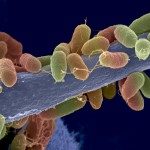Link to Pubmed [PMID] – 25377144
Cold Spring Harb Perspect Med 2015 Feb;5(2):a019786
The genus Aspergillus contains etiologic agents of aspergillosis. The clinical manifestations of the disease range from allergic reaction to invasive pulmonary infection. Among the pathogenic aspergilli, Aspergillus fumigatus is most ubiquitous in the environment and is the major cause of the disease, followed by Aspergillus flavus, Aspergillus niger, Aspergillus terreus, Aspergillus nidulans, and several species in the section Fumigati that morphologically resemble A. fumigatus. Patients that are at risk for acquiring aspergillosis are those with an altered immune system. Early diagnosis, species identification, and adequate antifungal therapy are key elements for treatment of the disease, especially in cases of pulmonary invasive aspergillosis that often advance very rapidly. Incorporating knowledge of the basic biology of Aspergillus species to that of the diseases that they cause is fundamental for further progress in the field.
